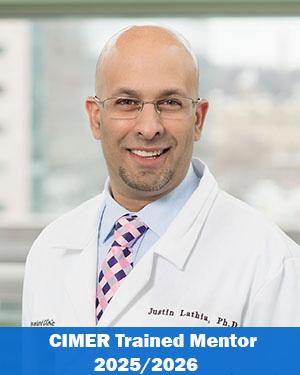Research News
05/11/2023
New study outlines how brain cancer cells take mitochondria from healthy cells to grow and survive
A mechanistic finding for glioblastoma shows mitochondria transfer to tumor cells is common and makes the cancer more aggressive.

Glioblastoma cancer cells use mitochondria from the central nervous system to grow and form more aggressive tumors, according to new Cleveland Clinic findings published in Nature Cancer.
The research showed that it’s common for healthy astrocytes – a type of glial cell with important functions in the central nervous system – to transfer the energy-producing organelles to glioblastoma cancer cells. When this process happens, it makes the cancer more deadly and the tumors more likely to grow. Researchers found that acquiring mitochondria boosted energy production and amplified cancer stem cells – cells with properties that already make cancer more difficult to treat.
“Defining the complex interactions glioblastoma cells have with the brain and nervous system is critical for developing new treatments,” says Justin Lathia, PhD, staff in Cardiovascular & Metabolic Sciences and the Melvin H. Burkhardt Endowed Chair for Neuro-Oncology Clinical Research. “We knew that this type of transfer was theoretically possible, but we didn’t know how relevant and dangerous it was in brain tumors.”
Cancers, including glioblastoma, are resilient in part because of resources in the environment, capitalizing on the body’s natural defenses to protect cancer cells. By determining how cancer cells interact with healthy cells to survive, researchers can design new treatments to block cancer from growing or resisting treatment.
This study investigated mitochondria transfer in glioblastoma, the most common and deadly type of primary brain cancer. The paper’s first co-authors are Dionysios C. Watson, MD, PhD, previously of Cleveland Clinic and University Hospitals, and Defne Bayik, PhD, previously of Cleveland Clinic. Both are now at University of Miami’s Sylvester Comprehensive Cancer Center.
Mitochondria are essential components of normal cells, so-called “powerhouses” that also play a major role in signaling processes like cell death. There are thousands of mitochondria in each cell. Mitochondria transfer between cells is part of an emerging type of cell-to-cell interaction that is still being explained.
Mitochondria are essential to cancer cells too; chemotherapy and radiation can target mitochondria to destroy tumors. Previous studies established that mitochondria transfer can also happen in other neurological conditions, like stroke, but ongoing research is figuring out the impact of transfer on disease and how it happens.
When cancer cells receive mitochondria, it affects the processes that produce energy. The study found in glioblastoma, this boost supports cancer stem cell properties including self-renewal and tumorigenicity, Dr. Lathia says.
“Cancer – and cancer treatment – does not exist in a vacuum,” Dr. Lathia says. “You’re not just treating and researching the tumors alone, instead tapping into a diverse ecosystem. Further research into this pathway can identify new strategies for treating glioblastoma, but also has potential for understanding other types of cancer.”
Featured Experts
News Category
Related News
Research areas
Want To Support Ground-Breaking Research at Cleveland Clinic?
Discover how you can help Cleveland Clinic save lives and continue to lead the transformation of healthcare.
Give to Cleveland Clinic